
Spring had arrived in Chicago, but wouldn’t you know it, just as people were putting away their winter clothes a snowstorm hit. It pushed in hard from the plains, its wind snapping off tree limbs and flattening daffodils. The snow was supposed to go all day, so Bernard reluctantly left his car behind and took the Ashland bus to his gallery on Chicago Avenue where Molly Upton, his most important artist, was to meet him for a walkthrough of her show before the opening at five o’clock.
At the gallery Bernard found Sinead, who did everything from computers to accounting, printing out the price list while Daryl dabbed paint over stray scuff marks on the walls. Sinead had been with him since he opened his gallery five years previously, Daryl only for the past two. Both had MFAs in painting from the Art Institute, but since graduating, Sinead had given up making art in favor of studying meditation with a local Buddhist monk. Daryl, on the other hand, who wore black-rimmed glasses and ponytail dreadlocks making him look like a hip young architect, wanted nothing so much as to make it big in the art world. When the gallery that represented him suddenly closed in early November, he immediately started looking for a new gallery, even pestering Bernard to take him on – this even though his paintings about growing up Black in a predominantly white rural county in North Carolina didn’t fit the least with the gallery’s abstract painting program.
Bernard draped his wet parka over the radiator before going into his office to sit down at his desk. Then he bent over to pull off his wet boots and slide his feet into his brown Bruno Magli loafers – shoes he loved that were a duplicate of the pair he kept at home. He wore his usual winter garb – a black Vince cashmere sweater and a pair of slim Levis. His attire, along with his buzz cut and meticulous, closely trimmed beard, made him feel he looked almost as cool as Daryl. Still, there were days he sat wistfully remembering his inner, yearning self from high school and college days, a time when he was obsessed with the history of ancient Rome and longed to fall in love.
Bernard took a deep breath before opening the two folders Sinead had left on his desk – a red one with a pile of to-be-paid invoices printed out for his approval and a blue one designated for incoming checks, which he knew before looking would be empty. A super-sized Mac screen, keyboard and mouse took up most of the desk, while a squat, late-blooming Christmas cactus, cheerfully impervious to its surroundings, sat off to the side.
Scrolling through his emails, Bernard found three that warranted opening. The first was from Molly, which he’d already read on his phone but decided to read again:
Hey Bernard,
Stopped by after you’d already left and saw Daryl’s installation…terrific. Sinead mentioned you already sold three paintings from the show. How great is that! Will stop by around noon tomorrow to look at the installation one more time before the opening and maybe we could talk about getting me money early?
— Molly
The second, sent the night before, was from Anne Lavelle, a wealthy Chicago collector with a successful art consulting business whom Bernard had known from years before when he’d run The Oak Ridge Inn in Laresville, Ohio. As an art dealer, he frequently collaborated with her on sales and art projects, and she was a huge fan of Molly’s work. Two weeks previously she’d bought three of Molly’s large new paintings, sight unseen, for her new client, Jessica Wolfson.
Bernard—
Give me a ring tomorrow after 1:00. I need to talk to you about something important. Texted you this as well.
xo A.
Ten to one, Bernard thought, Anne was being pressured by Jessica to deliver Molly’s paintings early. Rich people were like that – forever wanting whatever new toy they’d bought to arrive yesterday. He scribbled a note on a post-it to call Anne after Molly left the gallery.
The third email contained the monthly report of the gallery’s finances, sent by Sinead two days previously, which he finally mustered the will to open. As usual, columns of varying heights, a colored pie chart, lists of expenses, and gross and net proceeds, were assembled at the top. He scrolled down to what he grasped most easily – the graph tracking the month-to-month net worth of the gallery. Since the pandemic started, save for two little zigzags, the black line had been sloping downward. This month was no exception.
Bernard knew that with so many people getting sick and dying from COVID he had no right to complain, but the pandemic had taken a toll on his gallery. His cash reserves, which had seemed limitless when he first opened five years ago, were approaching zero. Staring at the graph, he felt his fingertips tap out the William Tell overture onto his desktop. If he could somehow manage to get Molly’s paintings to that horrible Wolfson woman in the next couple of days, and Anne paid him immediately, he’d be able to stave off his creditors. Molly would be distressed to find three paintings missing from her show, of course, and he’d have to come up with an excuse for delaying paying her, but Daryl was deft at adjusting installations and could easily make it look as if a smaller show had been planned from the start.
Bernard swiveled around in his chair and stared out the window at the cars crawling along Chicago Avenue. The snow turned the low brick buildings across the street into a blurry gray blob. The weather notwithstanding, Molly was so successful that she would draw a lot of local artists to her opening. They’d arrive carrying their secret hopes that some of her pixie dust would fall on them. They’d also use the opportunity to sidle up to Bernard and tell him he really needed to come see their new work.
Yet something was gnawing at Bernard – a feeling somewhere between ennui and despair – that went far beyond his financial woes and the tedium of dealing with forever needy artists. For the past year, in the middle of presentations to clients to whom he’d sold paintings on multiple occasions, he had found himself freezing mid-sentence, his face hot and flushed, realizing with a spasm that his words were bullshit. Bernard, who lived and breathed abstract painting, who prided himself on his unusual insights into the meaning of abstraction, felt he was losing his moxie.
Just this past week he’d been showing one of Molly’s large new paintings to a new client and her husband, talking and gesticulating robustly about how its looping, black calligraphic lines rested so delicately atop its linen ground , when a cruel homunculus, invisible to all but him, landed on his left shoulder and whispered in his ear that the dripped tar lines on the macadam surface in front of his apartment and the baking soda deodorant he dribbled in Pollock-like swirls atop the kitty litter his cat Mondrian used were just as beautiful as the Molly Upton painting he was pitching. More generally – and more destructively to his psyche – he was now lying awake in the middle of the night mulling over the possibility that contemporary abstract art was nothing more than a capitalist commodity – like pork bellies, only instead of being about pigs, it was about delusions.
He was now lying awake in the middle of the night mulling over the possibility that contemporary abstract art was nothing more than a capitalist commodity – like pork bellies, only instead of being about pigs, it was about delusions.
The clients he’d been dealing with for the past two years were a problem as well. The first thing they wanted to hear was how whether a given painting was relevant to today, followed by questions, asked with a vulgar straightforwardness he found embarrassing, about how much the art would appreciate in a year. In both cases, he could only answer by fancy prevaricating. Slowly swiveling back around to face his desk, Bernard whispered, “You’re a fucking fraud, Sauser. A fraud.”
Daryl, who was the only person to whom Bernard talked about any of this, kept telling him to get a grip. He also recommended taking THC gummies and increasing his time at the gym. Once, when they both got a little drunk together at a nearby bar, Daryl blurted out that art is nothing but a playground for the rich. “Stop torturing yourself and just sell the stuff,” he said, his hand resting heavily on Bernard’s shoulder as he called for more beer. “Artists make art and need money. Dealers like to hang around artists and sell art. You’re talented at getting rich people to part with their money for art. End of story. Relax.” With a smile more wry than sincere, he squeezed Bernard’s shoulder and added, “My only suggestion, and it’s a smart one, is that you include me in this game.”
* * * * *
Bernard was a few months past forty when he opened his Chicago gallery – perhaps too old for such a risky venture. Because his business experience was confined to managing a motel – albeit one that in size, architecture and function was more like a mid-sized hotel – his decision to open an art gallery struck everyone he knew as stark raving mad. Had a wealthy, superannuated aunt on his mother’s side not suddenly keeled over and bequeathed him a sum of money so large it required a wealth manager, he never would have dared to start such a venture.
Cindy was sitting in her armchair in the den working on a crossword puzzle when Bernard came into the room to announce his plans. “Bernard, would you please stop talking about your gallery idea? You really think that because you got attention for decorating the Oak Ridge with all those ugly Molly Upton modern art prints you’re equipped to be an art dealer and run a Chicago gallery? You’re such an ass sometimes.” Nibbling on the eraser end of her pencil, she suddenly and asked, “Do you know a six-letter word starting with ‘S’ that means ‘change’?”
“Cindy, could you stop for a minute and look at me just once? I’m dead serious. I’m going to open a gallery of contemporary abstract art in Chicago – this fall, to be precise. Running the fucking inn is suffocating me. I’ve discovered over the past three years that I love contemporary art and even if you make fun of me for that, I have a feel for it. I’ve learned from selling Molly’s prints to people who stay at the inn that I’m actually very good at selling art. I’m going to follow my dream.”
Cindy threw the puzzle down at her feet and stood up. “Suffocating? Seriously, Bernard? What, taking care of me and the boys is suffocating?”
“I didn’t say that.”
Standing across the room from him, Cindy jabbed her pencil toward him three times. “Yes. You. Did.” Then she stepped closer. “Whatever. I see that you’re serious. Stupid me for letting you go off to Chicago for months at a time to work with that slut Anne whats-her-name art consultant, gallivanting around and decorating yet another ugly hotel with more of that ugly Molly Upton art. All this time I thought your modern art thing was a nice little hobby for you. But no, I should have known. All it’s done is make you more selfish than you’ve always been. Let me tell you something. I’m not dragging myself and the boys to Chicago just to watch you throw away your inheritance.”
Bernard raised his palms, splaying his fingers wide. “Cindy, I never thought for a minute you’d follow me to Chicago, and I know it wouldn’t be good for the boys.” Then he brought up the unmentionable. “I did the honorable thing and married you when you got pregnant, but you and I both know our marriage has turned awful. But I won’t abandon you or the boys. Once in Chicago I’ll visit you as much as you want and in between visits I’ll Zoom with the boys as much as you want.”
Bernard relinquished half his inheritance to Cindy, guaranteed her a hefty monthly allowance for five years and set up a trust fund for the boys’ college education. That left more than enough money to support himself, launch his gallery and keep it afloat for at least five years.
“Go have your midlife crisis,” Cindy said as they finished signing the separation papers. She found that the turn of events that left her single and wealthy made her smile. “Go live out your dream-slash-nightmare but don’t come crawling back to me when you wake up from it.”
* * * * *
In June, Bernard located an apartment near Wicker Park through a real estate friend and found a gallery space to lease on Chicago Avenue. His first artist was Molly Upton, of course, but he quickly added several Chicago artists introduced to him by Anne Lavelle. He wined and dined clients with whom he’d done business while managing the inn, massaging their egos until they surprised themselves by buying art from him. He’d honed his hotel management networking skills to such a degree that he knew how to woo prospective new clients, introduced to him by Anne, as well as those he met through his expensive museum memberships.
Bernard had met Anne Lavelle at a hotel conference in Chicago while he was managing the Oak Ridge Inn two years before he ever imagined becoming an art dealer. She had come to hear his talk, “The Importance of Contemporary Art in Growing the Hospitality Industry,” and afterwards they got to chatting. By then, Bernard had become well known in the midwestern hotel industry as the savvy businessman who’d turned a dreary motel into a trendy destination site for midwestern conferences by virtue of installing dozens of large format color ink-jet prints – each a variation on a single abstract drawing made by Molly Upton, an unknown (at the time) Brooklyn artist – all over the walls.
Anne and Bernard ended up going for drinks and dinner after his lecture. There Anne, whose fifty-year-old face had been judiciously carved to make it look a mere forty-five years old, and whose curly auburn hair carried just the right number of $500-dollar blonde highlights, leaned forward in the candlelight to let her matinee-length pearls dangle down through the cleavage of her breasts into a soft puddle on the tabletop. She listed attentively to Bernard (whom she found handsome and sexy precisely because unlike most men she’d been with, he didn’t think of himself as either) as he reminisced about the French immigrant grandparents with whom he’d spent his childhood summers in rural Pennsylvania (a subject Cindy always contemptuously dismissed by profusely yawning whenever he broached it.) Anne even nudged him to try the little bit of French he remembered, which, under the influence of a smoky Cabernet, he handled haltingly, with limited vocabulary, but with a remarkably good accent. Glowing from the conversation, they went up to his hotel room and spent a ravishing if middle-aged night together. It was the first time Bernard had strayed off the ranch, but instead of feeling guilty, he was elated at the discovery that he was desirable.
Lying in bed together that first night, Bernard and Anne hatched a plan to collaborate on a year-long project she’d already started in which they would decorate a 300-room Chicago hotel with colorful ink-jet prints based on a new abstract drawing Bernard was sure he could persuade Molly to make. Molly, who had met Bernard only a few times at that point, initially protested that she was done with hotel art. Bernard had used her first diamond drawing without her permission to make prints for his inn. Wasn’t it enough she’d forgiven him for that atrocity? Abstract art hung in a hotel? It was degrading beyond belief. Anne and Bernard flew to New York and took her to dinner. While plying her with a fine Sancerre they persuaded her that making art for the new hotel project would enable her to put a down payment on a live-work space in Brooklyn. Molly smiled and said yes.
During the year Bernard was regularly driving back and forth between Laresville and Chicago to work with Anne on their hotel project, their affair (which Cindy pretended not to know about) gradually dulled and then dissipated into the ether. The two remained friends and collaborators, however, and Bernard began accompanying her to the studios of various Chicago artists she admired. This, along with continual visits to museums and galleries, subscribing to ArtForum and Art in America, studying books about modern and contemporary art history, and struggling through a parade of essays by such critics as Donald Kuspit, Peter Schjeldahl, Peter Plagens, bell hooks and Hal Foster, constituted the total of Bernard’s art education.
* * * * *
“Hey, great to see you,” Bernard said to Molly as she entered his office. For a second, he wondered if he’d put on too much Hugo Boss cologne.
Bernard gestured for Molly to sit down, and after handing her an espresso from the machine in the corner, sat down as well. “So it seems you’re happy with the show. I spotted everything the way you said except for two paintings that I switched. Oh, and Daryl did his usual brilliant installation.”
Molly was taken aback at how handsome Bernard seemed. When she’d first met him at the Oak Ridge Inn, he was soft and frumpy with limp black hair combed to the side. How had he turned so lean and suave and beautiful – like bald Pierce Brosnan? She knew she’d put Bernard on the map as an art dealer, but she also knew his repeatedly giving her one-person exhibitions had launched her career. It was because of Bernard that she’d been in a Whitney Biennial.
A swerve, Molly thought, as she stared at the swirling snow outside the window. Our little lives each took a swerve. They were upended the same way as happened in that odd little book about some papal secretary or other in the Renaissance who stumbled across a lost work by Lucretius, which then led to the revival of ancient Greek and Roman thought. Or something like that. Molly, who fancied herself an intellectual, couldn’t precisely remember any of this, but felt pleased with herself for drawing the connection.
“I love your hair,” Bernard said, breaking into her thoughts. He’d last seen Molly when it was long and brown, before COVID hit New York. Now that the pandemic had loosened its grip, she’d cut it to a bob with bangs and dyed it henna red. She was wearing an expensive-looking sparkly ultramarine blue tunic with black leggings and thick, black rubber-soled boots. Bernard recalled how oblivious to fashion she’d seemed when he first met her – dumpy, when you came right down to it. They’d had that horrific screaming encounter in his motel office (in truth, she’d done all the screaming; he’d merely hung his head and listened). She threatened to sue him for having turned her small abstract drawing, which she’d accidentally left behind at the inn, into colorful prints hanging on almost every wall in the “goddamn Oak Ridge Inn.” After he’d finally had a chance to explain that it was all a misunderstanding, and that he’d thought the drawing had been thrown out, fallen in love with it, and made prints from it, she forgave him.
After Bernard and Molly finished walking through the show, they said goodbye at the door. Outside, with the snow stinging her face, Molly turned around to Bernard and said, “Listen, before I forget, thank you again for selling those three paintings so fast. I feel bad asking, but I can really use the money as soon as you can get it.” Bernard gave her a thumbs up and returned to his office to call Anne.
Bernard had settled into his chair and propped his feet on his desk just as his phone rang. “Anne, hey. Wouldn’t you know it, I was just about to call you.”
“Bernard, yes, I’ve got something important to talk to you about,” Anne said. She sounded as if she were out of breath, making Bernard stiffen.
“I’ll get straight to the point. I have to cancel the Molly deal. I’m really sorry, but as you know the paintings were only on hold. Jessica Wolfson changed her mind. She’s suddenly decided to shift the entire focus of her collection away from abstraction.”
Bernard sat up straight before replying. “Well, Anne, this is really unexpected, to say the least. I mean, yes, you’re right, the paintings were only on hold. But come on, you put holds on paintings all the time and you’ve never once not followed through. I naturally assumed this would be the case here.”
“Bernard, you know I love Molly’s work,” Anne said. “But Jessica – well, unlike you – her fingers are on the pulse of what’s going on today.” The remark stung, but Bernard kept quiet.
“Remember she told us at your Christmas party about that lecture series she was Zooming? About how critical race theory teaches us about the fine arts? And how later on we laughed at how pretentious her ideas were? Well, it turns out she learned from those lectures that CRT emerged from postmodern thought, which she learned about when she was a semiotics major at Brown. Yesterday we had a long phone conversation in which she went on about how she now sees the flaw in universal values, objective knowledge, individual talent and oh my god, even political liberalism in general – everything you and I believe in. I had no idea that watching Zoom lectures could alter one’s ideas and even taste so dramatically, but, well, Jessica is a case in point. She says the mere idea of beautiful abstract painting now makes her want a Tylenol because – get this – beauty is in the eye of the beholder and the dominant beholder of beauty in the West is the white patriarchal male.”
Bernard remained speechless. “And don’t tell Molly this,” Anne continued, “but Jessica now says Molly’s paintings are quote-unquote irrelevant to the twenty-first century, and that hanging any of them in her home, including the two she already owns – which, by the way, she removed to storage just this week – would make her a hypocrite.”
So many words rushed to the front of Bernard’s brain that he couldn’t locate a coherent response. Finally he said, “So tell me, Anne, what’s she planning to do with that long living room wall of hers? I mean, when the three of us stood there looking at it back in January we agreed Molly’s new paintings would be – let’s not use the word ‘beautiful,’ let’s just say ‘perfect.’” For a second Bernard felt he’d made a real point.
“Don’t freak out when I tell you this,” Anne said. “Jessica now says she wants to buy three of Daryl Gavilan’s new paintings. When she met him at your Christmas party, she was smitten with him – I mean, so is every woman who meets him – but a few days after the three of us stood looking at her apartment wall Jessica had me take her to visit Daryl’s studio. He really can talk up a storm about his work, I must say. I should have told you, but honestly, Bernard, I thought nothing of it. Now Jessica’s telling me she wants his paintings instead of Molly’s.”
Bernard sat motionless in his chair. Daryl Gavilan, whose glitzy, gold-covered, gawkily drawn figures with limbs and fingers and toes that looked like fat sausages? With heads made of gold-plated circles? With mouths open to enormous dangling red epiglottises? With a palette dominated by acid-yellow and baby-puke green? This Jessica Wolfson wanted those Daryl paintings?
“Well, Anne, what can I say. This will be a big blow to Molly.”
“Bernard,” Anne said, “the fact is you should have emphasized to Molly that a hold doesn’t constitute a sale. Listen, I have to go. I’m terribly sorry, but I can’t go out in this weather. Give Molly my congrats and tell her I’ll see the show later.”
Bernard stood leaning against the entry to the middle gallery watching as Daryl positioned a level on top of one of the smaller paintings in the show – De Rerum Natura #4, 54 x 60 inches. It was more minimal than the large paintings, with only a single black line, bulging up slightly from the surface, moving around the painting as if it had been made by a meandering underground vole.
“What’s up?” Daryl asked, without turning around.
“What’s up,” Bernard said, “is that you stole Molly’s sale and I have half a mind to fucking fire you.”
Daryl leaned the level against the wall and turned around to face Bernard. Before speaking, he placed his hands on his hips. “If you mean because Jessica Wolfson wants to buy my paintings instead of Molly’s that means I stole a sale from her, I seriously disagree, man.”
“Don’t fuck with me, Daryl. This is wrong and you know it,” Bernard said. “You had Jessica over to your studio behind my back. You know as much as anyone that art is a zero-sum game, and when Jessica buys your paintings she’s not going to buy Molly’s paintings. That’s stealing, man. That’s bad, that’s really bad.”
“That’s stealing? You’ve got to be kidding,” Daryl said, and then added, “You’ve never thought of me as an artist, have you, Bernard? Not even once. I’m nothing to you but a gallery tool.”
Bernard, groping for an answer, grew flustered. “That’s ridiculous. I’ve always had nothing but respect for you – as an artist and as a person. I’m talking now about how you wouldn’t even have met Jessica if I hadn’t given you a job in my gallery.”
“Really? You’re going to go there?” Daryl asked. “I’m supposed to owe you something because I work for you?”
Bernard took a step closer to Daryl and said, “Yes, I do think a little gratitude is in order.”
“Let’s get something straight,” Daryl said, exasperated. “Everything in the art world is about endless chance encounters that come from networking. That’s how you became a dealer, that’s how you and Molly met, that’s how Molly and I became artists, that’s how you hired me, that’s how I met Jessica. I can’t help that Jessica chose my art over Molly’s. I’ve got a right to sell my art and Jessica has a right to buy what she wants. None of this is wrong. Like you said, art is a zero-sum game.”
Bernard heard himself almost pleading. “Daryl, come on. Molly’s your friend. She’s a mature artist who’s worked her ass off for almost twenty years to get to where she is now. You come along only a few years out of grad school and take a sale from her?”
Daryl rolled his eyes. “That’s really rich, Bernard,” he said. “And thanks for nothing for lowering my crime from ‘steal’ to ‘take.’ You and Molly are privileged white people who don’t even know it. You’ve always had things go your way. This makes you incapable of thinking. I’ve listened endlessly to the two of you go on about spiritual stuff and beauty and creativity, but what you really mean by those words is white artists holed up in lonely studios deluding themselves into thinking their abstractions are great because they come out of Cézanne or Kandinsky. I mean, get real. They were great artists and all that, but they’re history. And White history at that.”
Emboldened by the sound of his own words, Daryl continued. “You’ve had multiple chances to represent me and what did you do? You didn’t even give me a shot. Unlike you, Jessica gets my art. She gets that it’s about a system of beliefs going beyond the aesthetics of self-indulgence practiced by people like Molly. My art isn’t about me but about my whole community. My art speaks directly to people, people of color mostly, but also to whites like Jessica who are open to it. Abstract art can’t do any of that, Bernard. It’s too hemmed in, too bound up with whiteness. Artists like me, not Molly, are the future.”
Bernard stared dumbfounded at Daryl, who had already turned around and picked up the level to resume adjusting Molly’s painting.
After a pause, Bernard stood still and said, “I think you’re wrong, but I get what you’re saying. And I’m not going to fire you. Look, I admit your art isn’t to my taste, but you’re wrong that I don’t respect you as an artist. Anyway, it’s an enormous art world and there’s room for all kinds of art in it.”
It was a pathetic response, he knew, but it was spoken from the heart.
There was no time at the opening, with its enormous crowd, or at the noisy dinner party at Heritage that followed, to let Molly know about the cancelled sale.
By the time Bernard climbed into bed that night the storm was over, and the sky was clear as at a planetarium. Through his window he stared at the starry firmament above. Suddenly, everything he felt and wanted to say about the beauty and meaning of abstraction came to him – words he wished he’d found when confronting Daryl. Dimly, in the back of his mind, he heard his revenant French grandfather saying, “J’ai vraiment l’esprit d’escalier.” It was a staircase moment, where the things he hadn’t been able to say to Daryl that afternoon now came rushing in.
Bernard rolled onto his side and pulled his pillow to his chest. Tomorrow he’d call some of his clients to try to make some new sales for Molly. Shifting restlessly to his other side, he resolved to use his personal funds to keep the gallery going at least a while longer. Then, tossing the pillow to the floor, he lay on his back and decided he’d do a group show of abstract paintings with Molly and some new artists he’d never shown before, and with a full catalog. He’d write the essay himself.
Contributed by Laurie Fendrich
About the author: Laurie Fendrich is a painter, writer, and professor emerita of fine arts at Hofstra University.
Related post:
Fiction: The Square Drawing [Laurie Fendrich]
Fiction: Murder in the Studio [Laurie Fendrich]




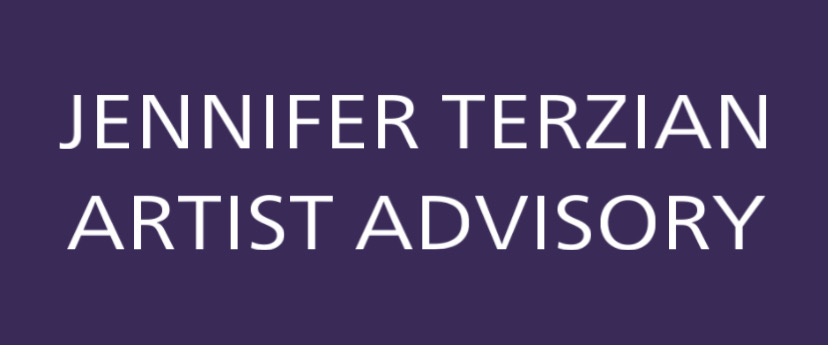

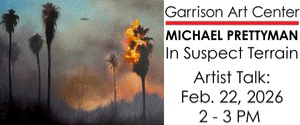
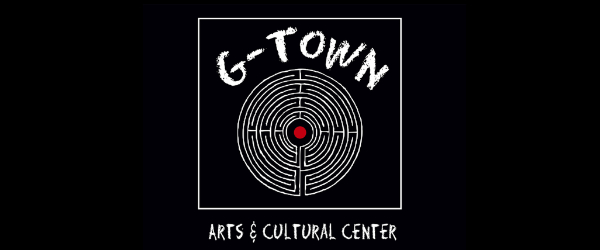











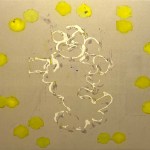
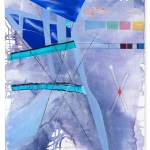

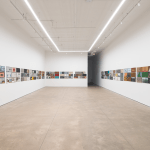
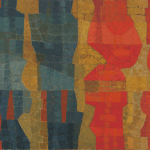
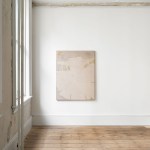
Fun read Laurie, interesting take on galleries. Always love reading tales of Chicago, my hometown.
The saga continues. I feel a novel in the works?
Laurie it’s a cliff hanger, I want more!! What happens next?
Very funny and quite sad. I loved the sharply drawn portraits of current art world characters– the stuck dealer; his needy, pliable mainstay artist; the shallow buyer; the betray-you-in-an -instant agent; the hipster aspiring-artist gallery assistant, full of hidden rage. Laurie pulls this off with her usual elegant economy. Her story telling gets better and better.
So, Switch, or Swerve?
Yes, sorry for the overly gnomic comment. “Switch” and “Swerve” are possible answers to the crossword puzzle question posed by the (soon to be ex-) wife: a six-letter word beginning with “S” meaning ‘change’. Both words appear in the text shortly afterwards. One might perhaps refine down the whole of the subsequent plot to the word “Switch”. Or “Swerve”. Certainly this is the dilemma facing Daryl when he awakes!
I like such Easter-Eggs, and thought that it deserved to be called out, even though only Laurie would get the comment.
This message is for Bob Mackay. I’m so glad you noticed these things to do with the “swerve.” I was playing around by having Cindy’s crossword puzzle asking for the word, yes. And I also thought it fun to have Molly name one of her paintings “De Rerum Natura,” Lucretius’s famous book that Molly says she remembers reading about in a book whose title (and author) she couldn’t recall. It was Stephen Greenblatt’s “The Swerve,” which recounted the discovery of Lucretius’s book in a monastery at the start of the Renaissance. The final irony that I really enjoy is that Greenblatt’s book is deeply flawed–Lucretius was known all through the Middle Ages and in general, where Greenblatt sees a swerve there never was anything but continuing, gradual transition from one historical moment to the next. I’m of the school that says we’re all always in transition and “swerves” are what we impose on certain moments even though they are very rare things.